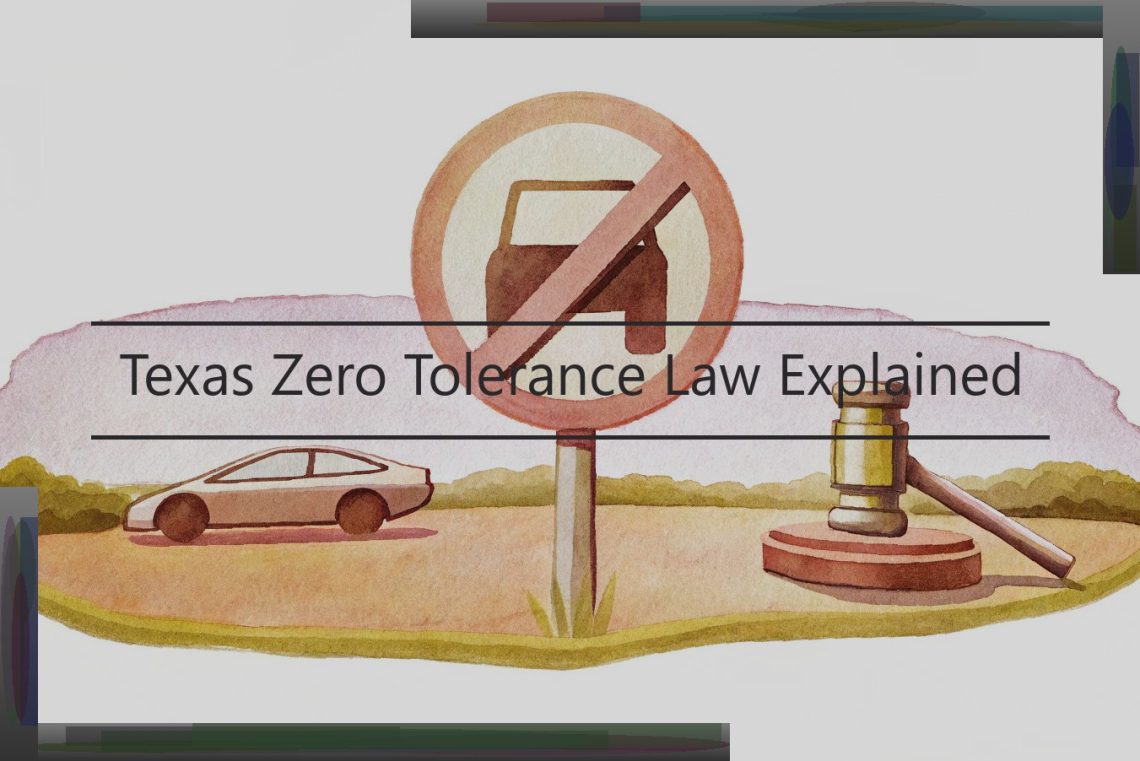
Texas Zero Tolerance Law Explained
Zero Tolerance Law Overview
In Texas, the Zero Tolerance Law is a statute that prescribes a zero BAC (.00) for minors. This means that there are both criminal and administrative consequences for being a minor with a detectable amount of alcohol in your system.
The purpose of the Zero Tolerance Law is to facilitate the enforcement of Texas’ Minor in Possession of Alcohol (MIP) law by making it illegal for minors to operate a motor vehicle with any detectable amount of alcohol in their system. If a minor has a BAC of . 08% or greater, the standard DWI laws apply, but for a BAC of .01 to .07%, the Zero Tolerance Law makes it illegal for them to drive.
The practical effect of this zero tolerance law, is that a BAC of .01 is enough to get a minor arrested for DWI and then hit with the regular DWI consequences. Many young people think that they can get away with a DWI if their BAC is below .08%. However, if you are a minor and blew a .07%, you will still be disappointed when you’re facing DWI charges.
Penalties for Minors
The Zero Tolerance Law applies to minors (children under the age of 21). For a minor found consuming or possessing alcohol, including being in a vehicle containing an open container or consuming from a false identification, the following legal consequences apply: These penalties (the fines and suspension) apply to each individual instance of offense. So, for example, if a minor is found consuming alcohol or with an open container on three different occasions, the fines could add up to $900 (for each instance of a $300 fine), and the suspension could add up to a year total (for each instance of a 30-day suspension). In addition to the above legal consequences, if a minor possesses a license (a driver’s license, learner’s permit, or provisional license), the license will be suspended for not less than 30 days. If they don’t have a license or permit, they will not be able to get one for 180 days.
Criminal Penalties While minors are prosecuted as juveniles, there are criminal penalties that can apply to minors under the Zero Tolerance Law. Any juvenile found guilty of purchasing, consuming, or possessing alcohol, including tobacco or falsifying identification to obtain alcohol, may be punished by a fine of up to $500.
Driving Privileges Suspension
The state’s zero tolerance statute affects the driving record of people under 21. Since the offense is an alcohol-related one, it will go on the minor’s record with the Texas Department of Public Safety. The point system will apply, meaning that if the person had other offenses that resulted in points against their license, those points will add up making a license suspension more likely. A minor convicted under the zero tolerance statute will not be able to drive until his or her 21st birthday. Even then, that overturned conviction will be part of the person’s driving record and could impact future apps for jobs or stability in life.
Law Enforcement Responsibilities
Under the Zero Tolerance Law, the decision to issue a citation or arrest an offender is often left to the discretion of the officer involved. A typical practice involves the officer investigating the offense, such as impaired driving, and determining whether the evidence suffices to issue an administrative driver’s license suspension or make an arrest. The officer will then either make the arrest or issue a citation when determining whether the alleged driver was intoxicated. If the driver appears sober but is underage or has an open container of alcohol, the officer may also issue a citation.
Officers need not feel compelled to make arrests for certain violations. Examples include minor vehicle violations, such as reckless driving or speeding, if the offender possesses no prior criminal history or the violation does not create a potential hazard. Officers may also decide against making an arrest in the case of minor assaults. In these situations, officers will often handle the violation by issuing a citation.
Even if the officer does not make a custody arrest, the citation involves a formal process. The officer will sign the citation and file it with the court. As of 2012, an arrest cannot be made for a misdemeanor offense regarding a public intoxication, so the offender does not have a criminal record. In this situation, the citation proceeds as an arraignment.
After the citation is filed, the court will hold a hearing for the offender in which they will plead guilty or not guilty. If the person pleads guilty, the case is resolved. If they plead not guilty, the case undergoes the process of a trial.
The presiding officer at the arraignment may grant personal bond for any misdemeanor offense. Personal bond allows the alleged offender to appear in front of the municipal court and does not require them to post bail. These personal bonds are often reviewed by the municipal court.
Preventative Methods
Municipalities in Texas implement a variety of measures to combat the dangers of underage drinking and driving on their roadways. Programs such as Project 18, in Houston, allow concerned citizens to report individuals who are serving alcohol to minors, and allows officers to handle these reports quickly and effectively.
The Texas Department of Transportation and Mothers Against Drunk Driving (MADD) are stalwart supporters for any legislation that results in less drinking and driving on Texas roadways. They have consistently engaged in educational programs so that parents can learn the truth about underage drinking rather than tales of exaggerations filled with hearsay spread by friends. MADD says that each year, nearly 800 teenagers die because of drunk driving in this state.
Local schools participate in or host several youth programs throughout the year that focus on education and prevention. For example, State Farm , the Dallas Independent School District (DISD) and MADD combined their resources in 2008 to launch a program called Stopping Underage Drinking Before It Starts. The program involves two national curriculum programs called license to Live and No-Refusal programs.
License to Live is a public education campaign started by MADD that promotes abstinence from alcohol consumption by high school students under the age of 21. It also promotes the idea that no one should engage in drinking and driving, regardless of their age. Through the License to Live program, students receive educational materials, public service announcements, brochures for parents and school assemblies. DISD has been the recipient of resources in the past, including in 2010, when 5,000 students grades 9 to 12 at 13 schools received Free Spirit T-shirts and magnets to wear and display to remind them not to drink and drive.
The No-Refusal program focuses on limiting the number of drunk drivers on Texas roadways by requiring that suspected intoxicated drivers who refuse to take breath tests undergo a blood test. Schools partnering with MADD for this program provide x-rays for students who sign up to attend a tour of the forensic lab at Southwestern Institute of Forensics Sciences to learn how blood alcohol concentrations are tested. In addition, booster clubs can sell No-Refusal Raffle Tickets to raise funds for school activities.
Case Illustrations and Scenarios
Texas’s Zero Tolerance Law has seen real-life applications and a variety of outcomes. One such case involves a young woman who was attending a high school football game in East Texas. During the game, she was approached by an acquaintance who asked her if she wanted to buy marijuana. She agreed, but while handing the cash over to him, she was spotted by an officer.
The officer investigated the situation and determined that she had not committed a crime. He then issued a citation on the Zero Tolerance Law based on her being at a school-sponsored event while possessing a controlled substance and issued a citation for possession of drug paraphernalia.
According to the state of Texas, she was guilty of both offenses though she had not used any of the marijuana and possessed only an empty baggie commonly used for the transport of marijuana.
The case was heard in municipal court. The judge and jury took about 10 minutes to reach their verdict of guilty with a 6-0 vote. To add insult to injury, the jury gave the young woman the maximum sentence and the judge ordered her to pay a fine of $2,500.
This case demonstrates a flaw in the Zero Tolerance Law whereby an offense occurs even if the drug isn’t being consumed, wasn’t being transported for consumption, wasn’t being sold, and wasn’t in the defendant’s possession at the time of the offense. Further, the court ignored the fact that the drug wasn’t actually a drug but was only an empty baggie.
One realistic scenario under the Zero Tolerance Law is that a teenager makes a poor choice and decides to try marijuana. They are caught using it at a school-scheduled event such as a football game. The reaction under the law is severe. A teenage girl was expelled from a public high school for using it at a basketball game. She also spent 30 days in an alternative disciplinary school. Her father, a local pastor, filed suit against the school district alleging lawsuits prohibited that action. Eventually, the court overturned the expulsion because the court found that the punishment was excessive.
The case demonstrates that all people – including students – are innocent until proven guilty. Further, it demonstrates that sometimes the courts make an appropriate decision. It should remind us all that just because you are found liable in civil court does not mean that you are guilty or even that you get convicted in criminal court.
Another example of how the Zero Tolerance Law was applied in Texas involved a high school student who took sleeping pills during finals week. She took the pills at the end of the day because she couldn’t study or take her final exam for the day. A police officer approached her and found her in possession of the pills. The police officer issued her a ticket under the Zero Tolerance Law though she had no other drugs or alcohol in her possession, was not selling drugs, and was not addicted to drugs. The police officer did not arrest her, which meant that she was not read her rights or booked into the detention center.
She still had to go to court on a misdemeanor drug charge, which meant that she missed school. She was found guilty and given 60 days probation, 40 hours of community service, and a $400 fine, which was done as part of a deferred adjudication. She avoided jail time, but only barely.
Common Questions
Q: Does the zero tolerance law really apply to recreational use marijuana?
A: It depends on what you mean. While zero tolerance and marijuana can be deemed related owing to both being illegal, they do not exist in the same world. The zero tolerance law is entirely separate from any marijuana offense. Consequently, while you may get 0.00 blood alcohol content (BAC) for your marijuana use, that doesn’t inherently mean marijuana is at least de facto legal in Texas. Conversely, marijuana is illegal and remains illegal in Texas.
Q: If I’m 21 and using alcohol, how much is too much?
A: For the zero tolerance law, there is no too much. Your BAC must be 0.00 percent or less. It’s as simple as that. If you’re over 21 and over 21 at least 0.08 percent. There is no difference to be made for the under-21 crowd here, however . Again, the zero tolerance law states you cannot have any alcohol in your system and drive.
Q: I have a medical marijuana card. What does that mean?
A: First and foremost, unless you have a card for use in Texas specifically, it has no bearing on the zero tolerance law in this state. Furthermore, the zero tolerance law remains in effect while you are in possession of marijuana, so we encourage you to take every precaution in handling your prescription and otherwise following any and all laws required.
Q: Is the zero tolerance law only for alcohol?
A: The zero tolerance law does only apply to alcohol. Any other substances in your system will be dealt with in accordance with the law on the books regarding the substance. There are no "your mileage may vary" situations or anything like that.




